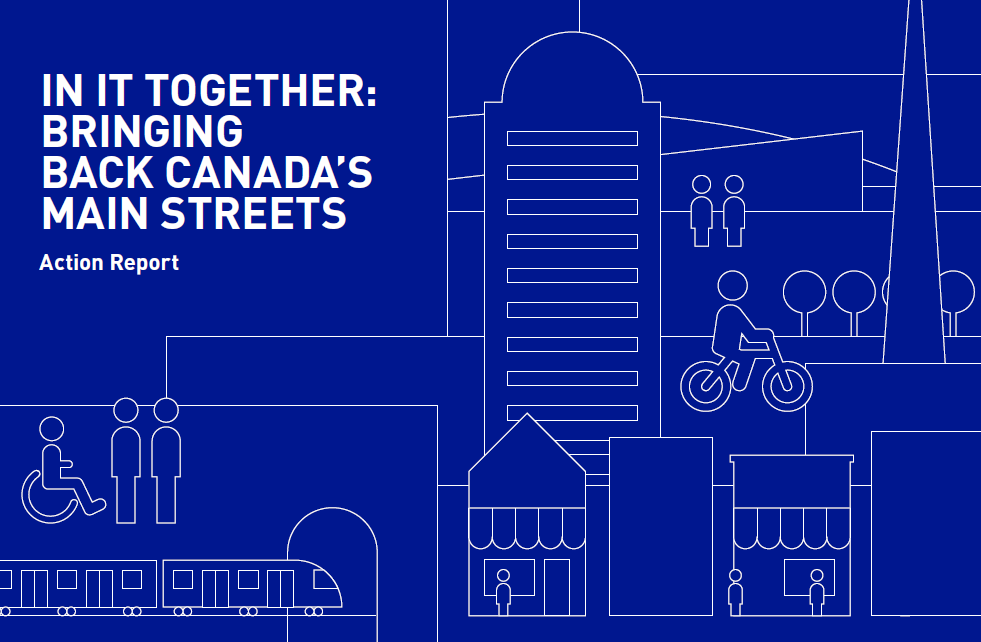A new report, produced by the Canadian Urban Institute (CUI) with partners across the country, urgently shines a light on the effects of the COVID-19 pandemic on main streets in Canada, and is offering dozens of actions for governments, business and community leaders to strengthen local economies, neighbourhoods, and communities.
Without further assistance for commercial rent, insurance premiums, and emergency financing for small business, there will be a surge in main street business closures in the coming months. COVID-related impacts on consumer behaviour and spending, local travel patterns, social service delivery, and housing have all contributed to the struggles for businesses and local institutions. The second wave of the novel coronavirus, with further public health restrictions, amplifies the threats to main streets.
In It Together: Bringing Back Canada’s Main Streets, intended for government policy makers, community leaders, and other main street partners, offers a menu of options that are nationally relevant but can be customized to local priorities, including immediately actionable solutions, and bold ideas for long-term planning.
From financial incentives, micro-grants, and crowdfunding platforms that support businesses adapting to winter during the pandemic, to strategies and design guidelines for winter-friendly placemaking, the report speaks to the urgency of mitigating the devastating effects this next wave, made worse by the colder weather, may have on Canadian main streets.
Canada’s main streets are home to businesses large and small, independent and chains, as well as community facilities such as libraries, community centres, transit stations, community organizations, academic institutions, faith centres, recreation facilities, and cultural attractions. They are shared places that attract a diverse mix of people for commerce, social interaction, and collective experiences ranging from public celebrations to protest.
“Main streets are in every neighborhood in Canada – from our largest cities to our smallest towns,” said Mary W. Rowe, President and CEO of the Canadian Urban Institute. “Rebuilding our economy, and the quality of our public life, will start in our local communities. This report, produced with Main Street partners coast to coast, gives everyone a roadmap for recovery, block by block”.
In It Together: Bringing Back Canada’s Main Streets is part of the Bring Back Main Street campaign, led by CUI, in collaboration with dozens of partners across the country. This nationally coordinated research and advocacy campaign is about finding the best solutions to ensure main streets recover and emerge stronger from COVID-19.
The report and full details about the campaign are available at bringbackmainstreet.ca.
“Let’s not forget to think about the night, because it isn’t just about consumptive revelry. Main streets and night spaces provide a place for people to be creative, explore their identities, and connect with their “chosen” families. After all, some of the best ideas and relationships were formed in bars.” – Sheena Jardine-Olade, Night Lab
“Coming out of COVID-19, neighbourhoods are going to face empty storefronts up and down their main streets in an economy in which it is harder for entrepreneurs to take risks. We’ll need to get very creative about encouraging new local businesses to ensure neighbourhoods have the dynamism and services they need to thrive.” – Jon Shell, Social Capital Partners and Save Small Business
“The pandemic is just the gasoline that’s been poured on the fire of main street troubles.” – Charles Montgomery, Happy City
For media inquiries, contact:
Juan Luis Garrido
jgarrido@canurb.org
416 365-0816 ext. 290
About the Canadian Urban Institute
CUI is Canada’s Urban Institute. We are the national platform that houses the best in Canadian city-building – where policymakers, urban professionals, civic and business leaders, community activists and academics can learn, share and collaborate with one another from coast to coast to coast.

